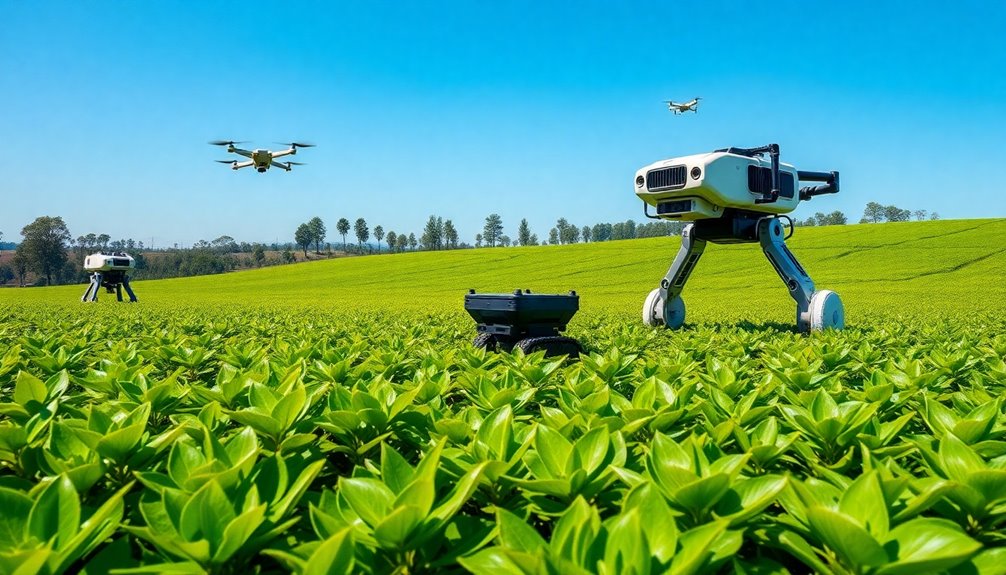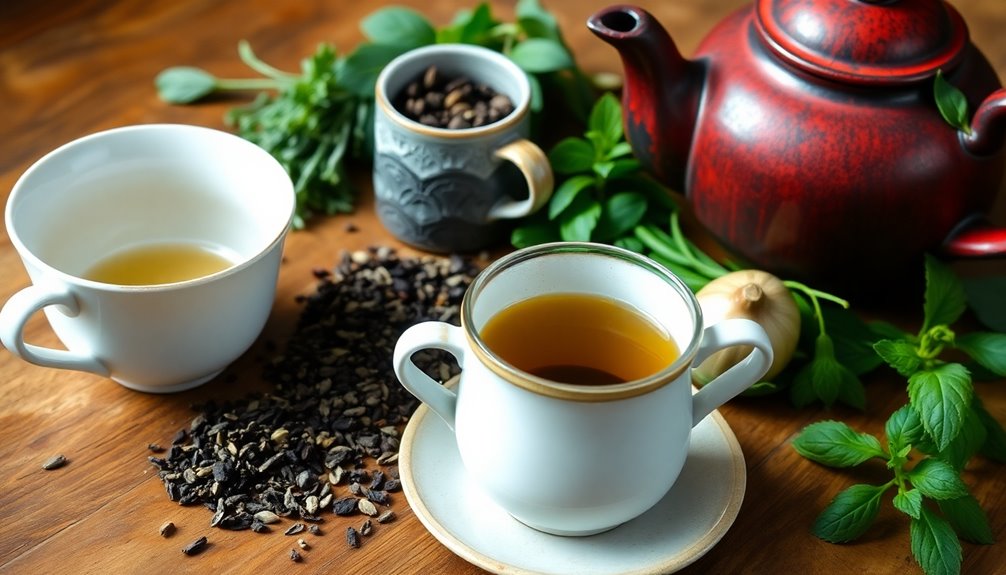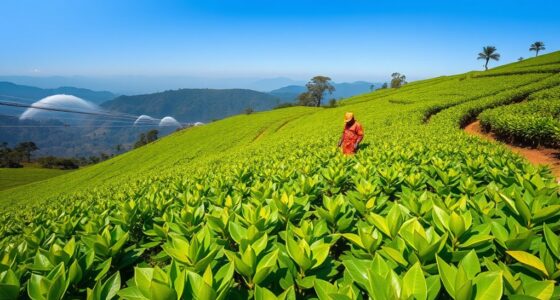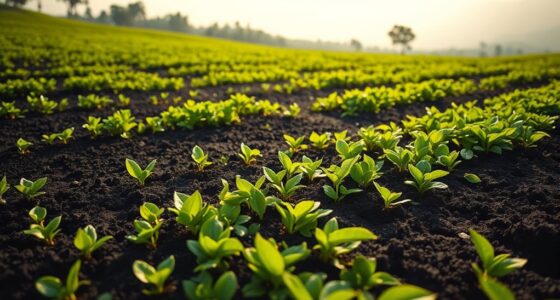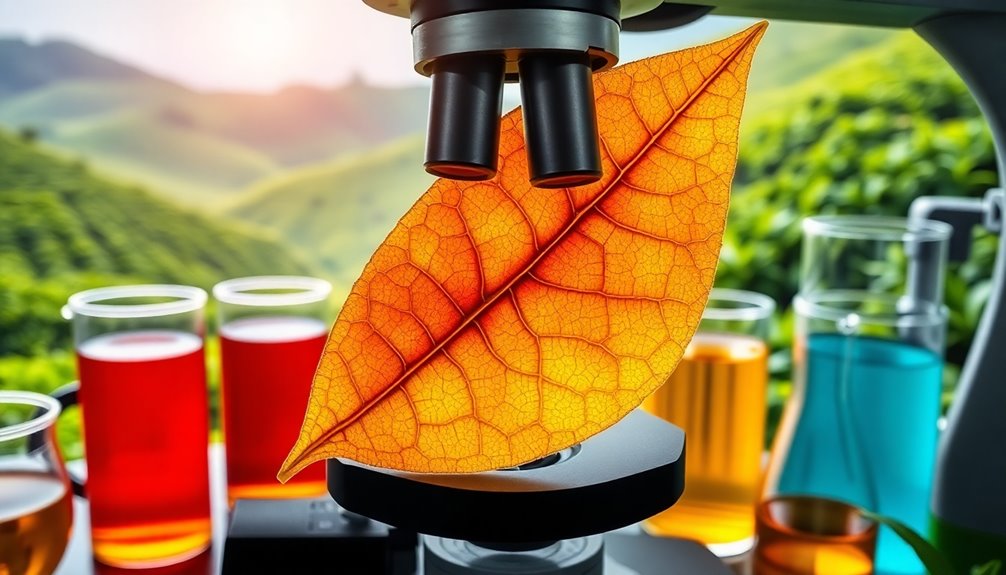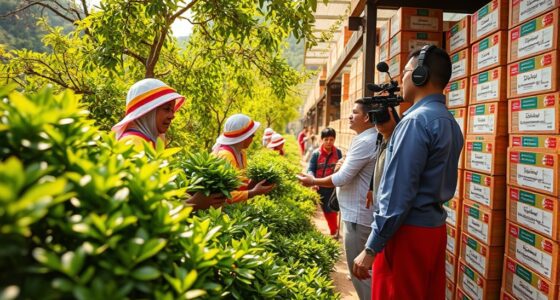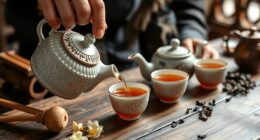In modern tea production, technology plays a crucial role in boosting efficiency and quality. IoT sensors and drones help you monitor crop health, while AI-driven machines select only the best leaves to harvest. Advanced processing equipment maintains optimal conditions, ensuring your tea tastes just right. Automation and machine learning streamline flavor profiling, allowing for unique blends tailored to consumer preferences. Additionally, blockchain technology enhances transparency in the supply chain. By embracing these innovations, you're not just improving production but also supporting sustainable practices. There's much more to uncover about these technologies and their impact on the tea industry.
Key Takeaways
- IoT sensors and drones monitor crop health, optimizing growing conditions for improved tea quality and yield.
- AI-driven mechanical harvesters selectively pick mature tea leaves, reducing labor costs and enhancing efficiency in production.
- Automated processing machines regulate temperature and humidity, ensuring consistent quality in tea production.
- Blockchain technology enhances traceability in the tea supply chain, promoting transparency from farm to consumer.
- Machine learning and AI analyze flavor profiles, improving product diversity and aligning with consumer preferences for innovative blends.
Introduction
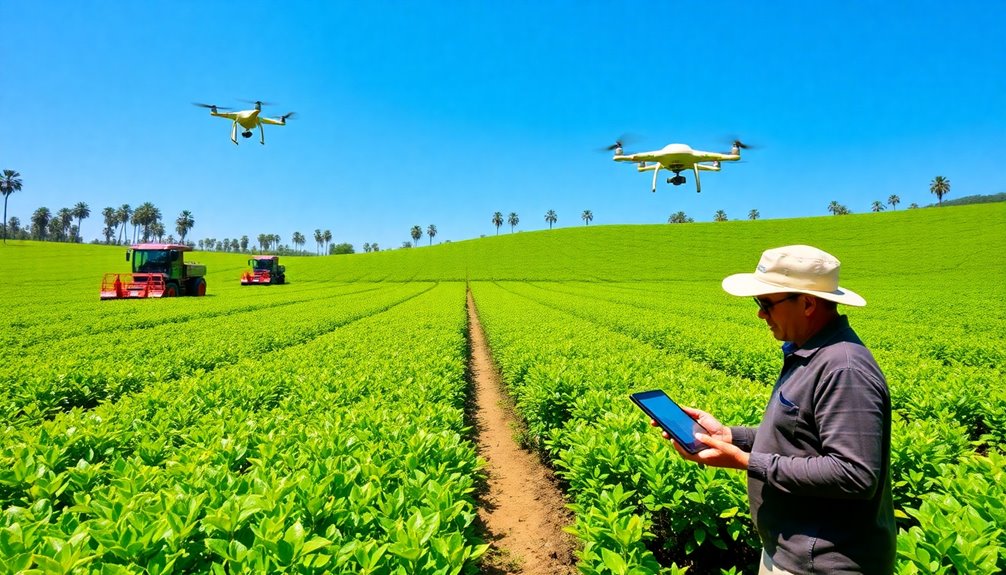
In today's fast-paced world, technology plays a crucial role in transforming tea production. With the integration of intelligent technologies, you can now monitor crop health using IoT sensors and drones, optimizing growing conditions and boosting efficiency.
Automation has revolutionized the tea production process, as mechanical harvesters equipped with AI selectively pluck mature leaves. This innovation not only reduces labor costs but also enhances harvesting speed, ensuring you get the best quality tea leaves.
Advanced processing techniques further elevate the quality control standards in the industry. Automated machines regulate temperature and humidity, guaranteeing consistency across tea batches and improving flavor through controlled fermentation.
Plus, blockchain technology is making waves by enhancing traceability in the tea supply chain. You can now track the origin of your tea, ensuring transparency and confidence in quality control measures.
Emerging Technologies in Tea Processing

Harnessing cutting-edge advancements, tea processing is undergoing a significant transformation that elevates both efficiency and quality. Tea manufacturers are increasingly adopting automated machines that precisely control temperature and humidity, ensuring consistent tea quality across batches.
These intelligent systems utilize deep learning applications like YOLOv3 to enhance tea quality assessment, accurately identifying buds during processing.
Moreover, modern processing methods now incorporate hyperspectral imaging and fluorescence sensing techniques, allowing for nondestructive testing of tea quality. This includes moisture monitoring and caffeine detection, helping you maintain optimal standards.
The sorting of fresh tea leaves has also seen improvement thanks to deep learning, which differentiates between acceptable and inferior leaves, streamlining the selection process.
Additionally, research on ultrasonication-assisted enzymatic extraction is paving the way for innovative low-calorie ready-to-drink tea products. This not only enhances flavor but also improves nutritional profiles, catering to today's health-conscious consumers.
With these emerging technologies, you can expect a new era in tea processing that promises to deliver exceptional quality and efficiency while meeting the diverse demands of the market.
Ai-Driven Flavor Profiling Techniques
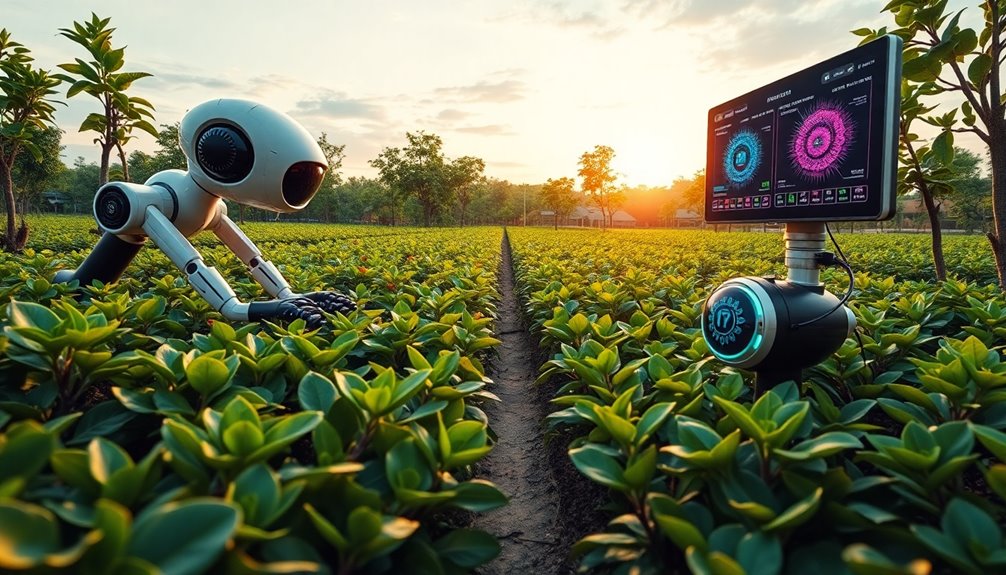
Advancements in tea processing have set the stage for innovative techniques in flavor profiling, where AI now plays a pivotal role. By utilizing machine learning algorithms, you can analyze the chemical compounds in tea leaves, enabling you to identify and replicate desirable flavor profiles with impressive precision.
Advanced sensory analysis combined with AI allows for the classification of tea flavors based on consumer preferences, enhancing your product development and marketing strategies.
When you employ AI to assess data from various brewing conditions, you optimize the flavor extraction process, leading to consistent and high-quality tea products. AI algorithms can even predict potential flavor outcomes by simulating different processing techniques and environmental conditions, helping you create unique tea blends that stand out in the market.
Moreover, integrating AI in flavor profiling not only improves the quality of your tea but also supports sustainable practices by reducing waste during the trial-and-error phases of flavor development.
With these technological advancements, you're better equipped to meet consumer demands while maintaining the integrity and richness of your tea offerings. Embrace AI-driven flavor profiling techniques to elevate your tea production to new heights.
Ai-Guided Tea Flavor Profiles
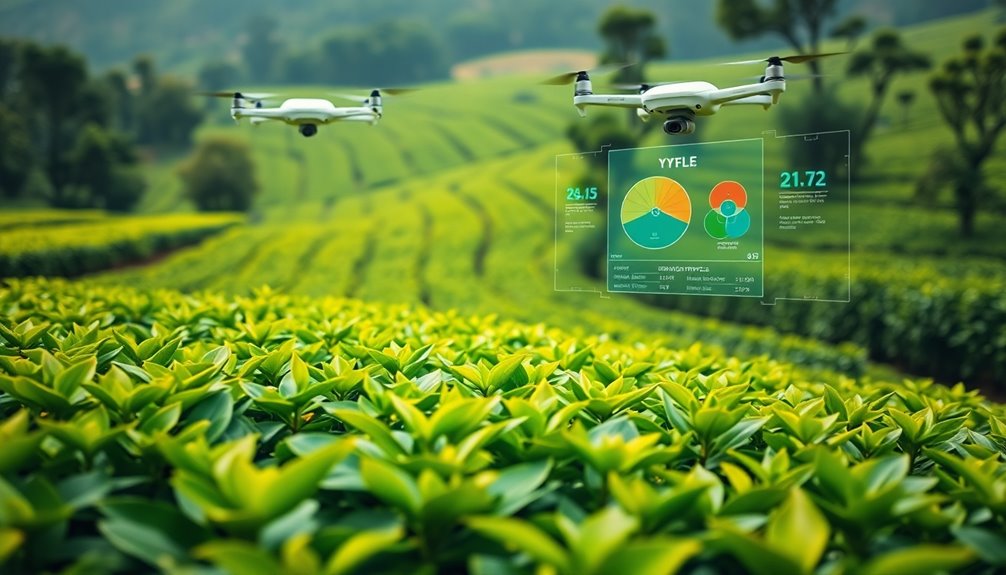
AI-guided tea flavor profiles are revolutionizing how producers cultivate and process tea. By leveraging artificial intelligence, you can analyze soil and environmental conditions to optimize growing practices for specific flavor outcomes.
Using machine learning algorithms, you can predict how different cultivation techniques affect the flavor of the tea, allowing you to pluck tea leaves at just the right moment for maximum taste.
Advanced data analytics play a crucial role in identifying the ideal fermentation conditions. Since tea fermentation significantly influences aroma and flavor characteristics, achieving the right balance can enhance the quality of tea.
AI-driven sensory analysis tools also assess the chemical composition of tea leaves, helping you develop unique flavor profiles that cater to consumer preferences.
This integration of AI not only supports the creation of innovative tea blends but also enhances product diversity and market competitiveness.
Data Privacy Concerns

As technology transforms tea production, data privacy concerns are becoming increasingly significant. The integration of IoT devices allows for enhanced efficiency, but it also raises questions about the collection and storage of sensitive data related to farming practices and consumer preferences.
When you use mobile apps to monitor tea cultivation, remember that inadequate security protocols can expose farmers to potential data breaches.
Blockchain technology offers improved traceability in the tea supply chain, yet it requires rigorous data privacy measures to safeguard personal information shared with consumers.
You're likely aware that data privacy regulations, like GDPR, impact how tea producers manage customer data collected through e-commerce platforms and marketing campaigns.
Transparency in data usage is crucial; consumers need to know how their information is being utilized and must provide consent.
Building trust within the tea industry hinges on these factors as technology continues to evolve and collect more data.
Practical Applications
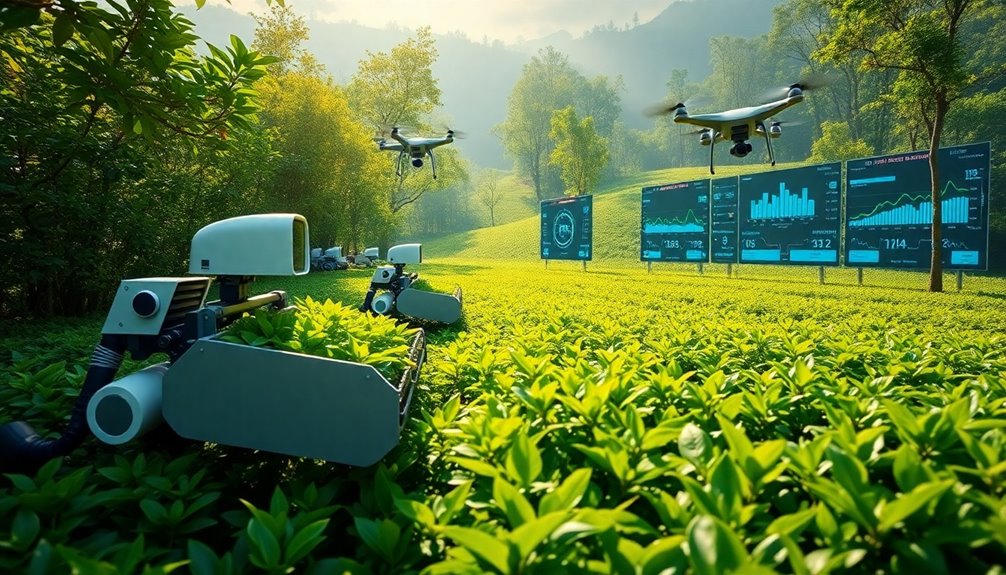
In the realm of modern tea production, practical applications of technology are revolutionizing how you cultivate and process tea. With precision agriculture technologies like IoT sensors and drones, you can monitor soil conditions and plant health in real-time. This significantly enhances your decision-making regarding irrigation and fertilization, ensuring optimal growth.
Automation in tea harvesting has transformed the way you gather tea leaves. Mechanical harvesters equipped with sensors and AI can selectively pluck mature leaves, increasing efficiency while reducing labor costs.
Additionally, advanced processing techniques, including automated machines that regulate temperature and humidity, ensure consistent quality across batches, enhancing flavors through controlled fermentation.
AI-powered systems, particularly Deep Convolutional Neural Networks, play a crucial role in early disease detection in your tea plants. This proactive approach helps you maintain high quality and prevent degradation.
Lastly, integrating blockchain technology into your supply chain enhances traceability and quality control. By monitoring environmental conditions and pesticide use, you not only foster consumer trust but also promote sustainability within the industry.
Conclusion
In conclusion, technology's role in modern tea production is undeniably transformative. By embracing emerging technologies, you can enhance flavor profiling and optimize processing techniques. AI-driven insights not only elevate the quality of your tea but also streamline production, making it more efficient. However, it's crucial to stay mindful of data privacy concerns as you navigate these advancements. Ultimately, leveraging technology can lead to a richer tea experience while maintaining ethical practices in the industry.

